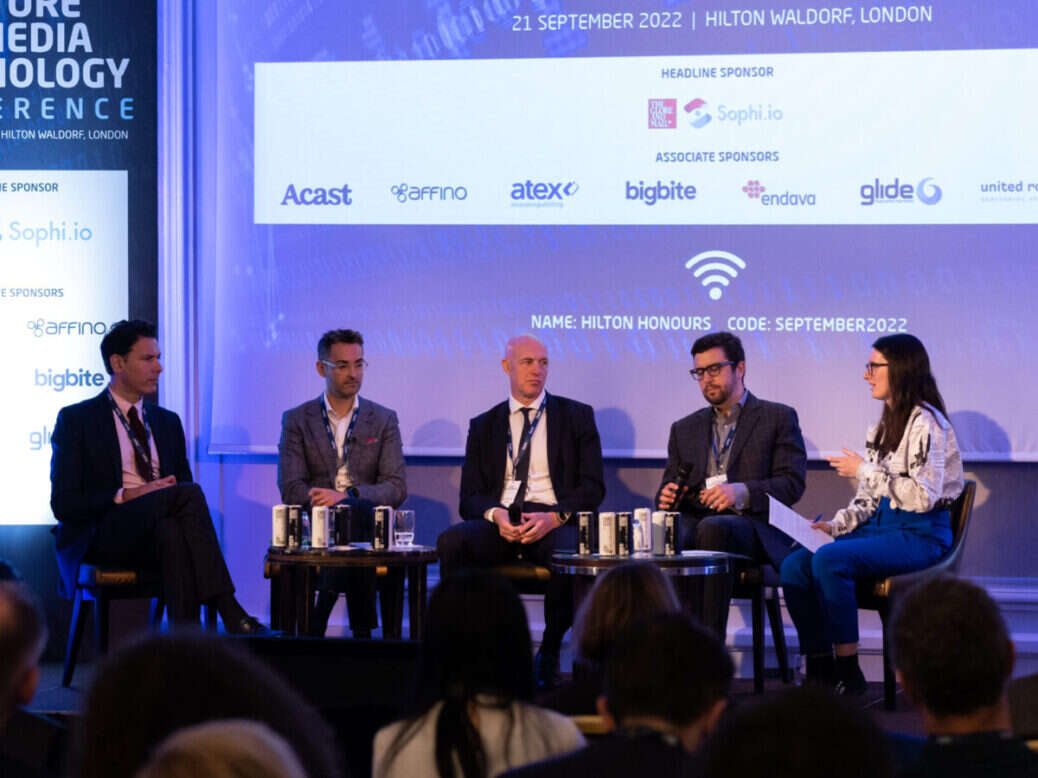
Branded babygrows and socks, NFTs as subscription keys and dynamic paywalls were among the new publisher revenue strategies discussed at Press Gazette’s Future of Media Technology Conference.
Bosses at News UK, Forbes, Footballco and Canada’s Globe and Mail discussed a range of revenue strategies at the Waldorf Hotel in London on 21 September and shared what is -and isn’t – working. Here are a few highlights from their panel.
It’s not paywalls versus advertising
One part of the agenda for the panel was “paywalls versus advertising”. But News UK chief operating officer David Dinsmore said: “I don’t think it’s paywalls versus advertising, I think it’s paywalls and advertising, and both are an outcome of customer engagement and if we do not engage our customers then we cannot hope for any revenue and the models will never work.”
Dinsmore gave the examples of News UK titles The Times, which targets “cash rich time poor” readers for subscriptions, versus The Sun, which has more readers who are “perhaps on a tighter budget at the other end of the market where a subscription is something you really have to think twice about”.
“You’ve got to really focus on one to make sure you get that world class,” he said.
Of The Times, which had the first hard paywall on Fleet Street in 2010, Dinsmore said: “What the trick now is how you get advertisers increasingly interested in that really well-defined large and growing digital audience because this is from an advertising perspective the Times audience is one of the richest seams in the country, so it very quickly becomes paywall plus advertising.”
Whereas at The Sun, where a hard paywall was trialled for two years but scrapped in 2015: “We now have an advertising machine that is firing on all cylinders but the trick there is how do we now get those Sun super fans of which there is a large number, millions, of them, how do we now get more revenue from them.
“We have examples of that with Sun Bingo and other areas but we will again need to extend how we do that going forward and I think there are great opportunities over the next few years to do that.”
Gabe Gonda, VP of the Globe and Mail’s machine-learning start-up Sophi.io, said the Canadian newspaper’s revenue was split by 70/30 towards advertising ten years ago but has now flipped it to 65/35 user revenue.
This was done, he said, by creating Sophi.io and allowing it to recognise – in a similar way to that division between Times and Sun readers – those who are “time poor and cash rich” with a “high propensity” to pay versus those who should be allowed to “ride for free” and help generate more advertising revenue.
“The beauty of a dynamic paywall is it optimises for both segments,” he said.
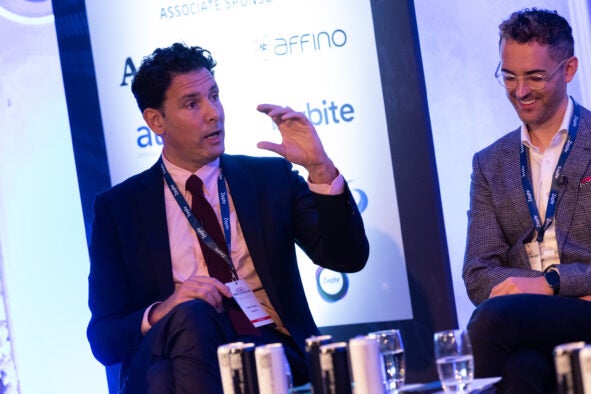
At Forbes, managing director for Europe Alex Wood said an ad-funded model “is going to be at the core of our business long term”.
Wood said: “We believe that because we are such a broad church… as an organisation, we’re reaching 140 million people every single month, we are vastly larger than any of our business competitors, and yet within that we set a strategy around two years ago around this idea of communities at scale, this idea that we are a broad church but within Forbes we have these different clusters of expertise,” referring to its CMO network and 30 Under 30 community.
But at the same time Forbes also runs a metered paywall on certain pieces of premium content which it can tell readers are “something you should subscribe to Forbes for”.
And at Footballco, the decision was taken to concentrate on an advertising-based model. Chief executive Juan Delgado said: “In our view, we publish mostly football news and that is pretty widely available, and so similar to The Sun we have drawn the conclusion that it is very unlikely for people to pay for that.” He did acknowledge, however, that The Athletic had managed to convince people to pay for football content at scale.
Footballco does have a premium content offering however after buying the eight-year-old football magazine Mundial, which has a few tens of thousands of subscribers and a higher revenue per user.
Delgado said: “…by focusing on reaching that very specific audience that is willing to pay for a premium glossy quality content, probably bundled with some other membership qualities, is the way we think about trying to monetise that audience and trying to find that sub-segment of people that will ultimately pay for content.”
How to negotiate with tech giants
Both News UK and the Globe and Mail shared a view that a constructive partner-like relationship with the tech giants is more beneficial than the adversarial, combative tone that has often been the talk of panels in the past.
Gonda said: “We see a great opportunity, and we’ve negotiated deals on this basis, with both Google and Apple to find bigger undifferentiated audiences. And unlike the other folks on the panel we’re relatively small, we have ten million uniques or somewhere thereabouts… and so for us that kind of reach can really matter.
“We see both Apple and Google as good partners… it matters that we bring quality news, quality journalism and [if] they can help us find bigger audiences and paying customers for it all the better.”
News UK similarly has content payment deals with Google and Apple and Dinsmore said: “Our aim has always been to get fair value for content and to level the playing field as best we can. The great thing about these deals is that yes there is a cheque but there is also, as Gabe was alluding to, getting the ecosystem to work better for journalism frankly and for our business models.
“So that’s actually having a proper partnership where you’re able to have a partner-like conversation rather than an adversarial one is a real benefit. So it’s by no means solved the issue, but we’ve made a great start on that.”
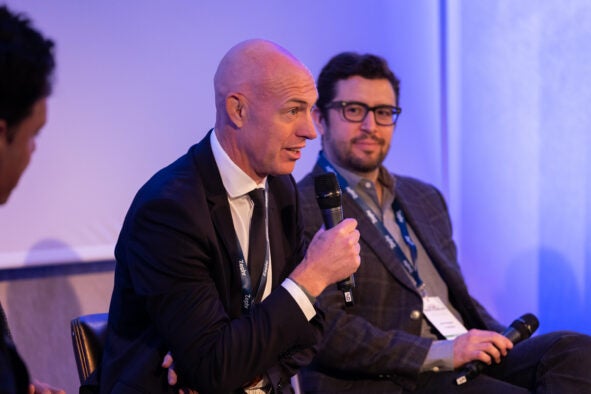
‘Wait for the wave’ on Web3
Forbes claims to have been the first magazine publisher to have turned a cover into an NFT in April 2021, raising around $500,000 for charity, but Wood said: “I don’t think it’s sustainable in the long term, I think it was more of a novelty.”
He added: “Blockchain comes up a lot in meetings and people talk about these things but for us it’s very much an experimental phase.”
News UK’s Dinsmore similarly said the idea of saying a digital image is worth $200m is “not sustainable” but suggested other ways NFTs could work.
“If you look at the digital image as a token and you can attach more value to that, which might be a subscription for instance, it might be have lunch with the editor once a year, and through blockchain you can track exactly what that value is and who the owner is – so there’ll be no more passing your password onto 25 members of your family and friends, it will be one person, one subscription, that’s the power of blockchain.”
And Footballco’s Delgado said: “I do think if I had a dime for every time my board asked about NFTs in the last 18 months I’d probably be a rich man.
“NFTs are not going away, crypto’s not going away, and blockchain has opened up that channel but it’s hard to understand how you can monetise NFTs… We’ve done some stuff that hasn’t worked and we’ll keep at it.”
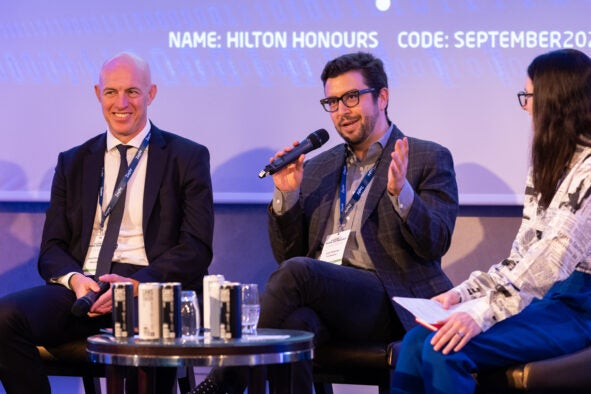
Selling branded merch around your media ‘cult’
Wood at Forbes and Footballco’s Delgado both discussed how they had been surprised at the popularity of branded merchandise for their brands, with their own online stores sitting neatly alongside e-commerce in their consumer revenue strategies.
Wood said the business publisher’s revenue increased by 40% year-on-year last year, “largely driven” by this two-fold consumer strategy.
He admitted the success of the merchandise store, which launched in July 2021, had “even surprised us internally”.
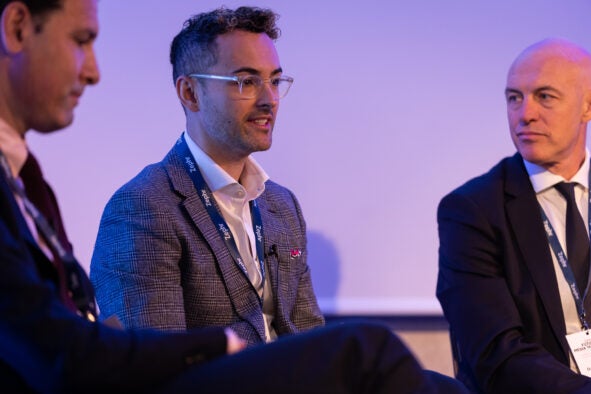
“People want to wear the brand Forbes. I just recently had my first baby and all my colleagues bought me the Forbes babygrows that have ‘future CEO’ on them and they have been a huge success for us.
“I think it reminds us that media brands are loved by people for many, many different reasons and actually they want to be part of that so it’s a natural extension to have that shop where people can be part of it.”
Meanwhile Delgado said Footballco had experienced similar success, and that Mundial-branded socks were the title’s biggest selling item outside the magazine itself.
Delgado said: “We also have been surprised that across two brands, Goal and Mundial, people like to buy stuff with our logo on it.”
He said the Goal Studio store launched about three years ago and was now “in the tens of millions of gross revenue”, although he noted: “We have learned the hard way that actually creating stuff that you wear is very low margin versus media so that’s taken a while to build, but it’s actually worked out pretty well.”
Although magazine Mundial is a much smaller brand than Goal, Delgado said: “…its highest selling item outside of the magazine is socks, like Mundial branded socks, and it’s amazing just how you create a brand that ultimately builds a – please don’t take this the wrong way – cult around the brand and how it is perceived by people.
“You can sell pretty much whatever you come up with as long as it’s authentic and it sticks to the brand ethos of the audience that you’re trying to address.”
Picture: ASV Photography Ltd
Email pged@pressgazette.co.uk to point out mistakes, provide story tips or send in a letter for publication on our "Letters Page" blog
